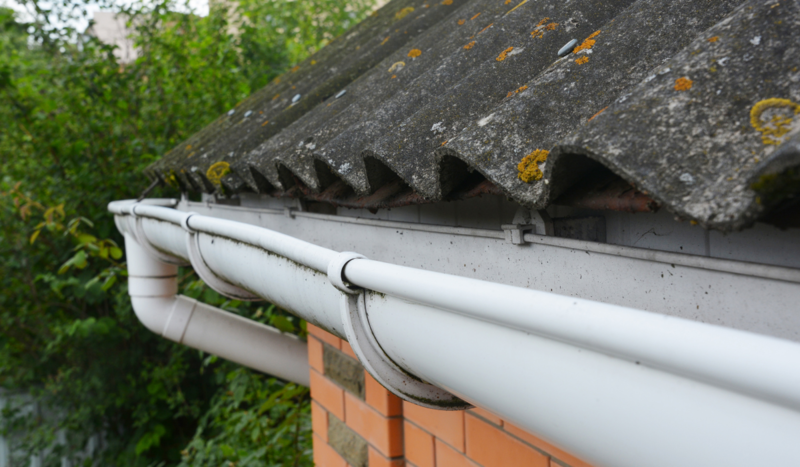Asbestos
Asbestos can be dangerous if moved or damaged. You must get permission from your Neighbourhood Co-ordinator before you improve or adapt your home.

What is asbestos?
Asbestos is a natural mineral made up of tiny fibres that are strong, heat-resistant, and chemical-resistant. Because of these properties, it was widely used in construction until it was banned in the UK in 1999.
There are three main types of asbestos:
- Crocidolite (Blue Asbestos)
- Amosite (Brown Asbestos)
- Chrysotile (White Asbestos)
Where asbestos may be found in homes
The most common asbestos containing materials in homes are low-risk and include:
- Textured coatings (e.g. Artex)
- Floor tiles and adhesives
These materials are bonded, meaning the fibres are not easily released unless damaged.

What to do if you suspect asbestos
Many homes built before 1999 may contain asbestos materials. While this can sound concerning, asbestos is generally safe if it’s in good condition and left undisturbed.
If you think there may be asbestos in your home, don’t worry. It’s common and usually not harmful unless disturbed.
You cannot tell if a material contains asbestos just by looking at it.
If you suspect damaged asbestos:
- Do not touch or disturb it
- Do not attempt to remove or repair it
- Avoid dusting, sweeping or vacuuming the area
Instead, please contact our dedicated asbestos team for advice and support. They have access to information about your home and can advise on the likelihood of any asbestos-containing materials being present.
To get in touch with the asbestos team, please call 0191 525 5085 or email asbestosrequests@gentoogroup.com
Understanding the risks
Asbestos only becomes a health risk when fibres are released into the air and breathed in. This can happen if materials are damaged or disturbed, especially during DIY or refurbishment work. Long term exposure to airborne asbestos fibres can lead to serious health issues.
Planning home improvements?
Before starting any refurbishment work (e.g. drilling, sanding, or sawing), please:
- Speak to your Neighbourhood Coordinator, or
- Contact our Asbestos Team by calling 0191 525 5085 or email asbestosrequests@gentoogroup.com
We’ll check if it’s safe to proceed and advise on any precautions.
How we manage asbestos
We take asbestos safety seriously. Our qualified asbestos team works with accredited contractors to manage and remove asbestos safely.
We are responsible for:
- Maintaining an asbestos register for all non-domestic properties (e.g. communal areas, stairwells)
- Assessing asbestos risks in customers’ homes
- Arranging asbestos surveys and removal when needed
If a survey is required:
We'll contact you to arrange access for our specialist contractors. It's important that we (or our contractors) can access your home when needed to carry out essential work.
There are 3 stages to the asbestos survey:
- Stage one
Our approved specialist contractors will carry out the required survey. They will complete a full report of their findings within 10 days of surveying your home.
- Stage two
Our dedicated team reviews the report. If any asbestos containing materials are a potential risk, we will let you know as soon as possible and advise on the next steps and how to stay safe.
- Stage three
We will instruct our licensed asbestos removal contractor to complete any work required in a controlled and professional manner, ensuring your safety and your home's safety is crucial.
There are two main types of surveys:
- Management survey: We will need access to all rooms (including lofts) to collect samples.
- Targeted refurbishment survey: We will need access to the specific areas affected
Surveys typically take around 40 minutes.
For more information about asbestos safety, click here for: Your guide to asbestos safety
In line with Health and Safety Executive (HSE) guidance, we may leave asbestos in place if it is:
- In good condition
- Unlikely to be disturbed
- Assessed as low risk by our accredited surveyors
We also carry out regular inspections in communal areas of flats and sheltered housing to ensure ongoing safety.
Getting information in a different format
You can:
- Email communications@gentoogroup.com
- Call 0191 525 5000
- Write to Communications Team, Gentoo, Emperor House, 2 Emperor Way, Doxford International Business Park, Sunderland, SR3 3XR
Tell us what format you need the information in. This could be:
- another language
- an accessible PDF
- large print
- easy read
- audio recording
- braille